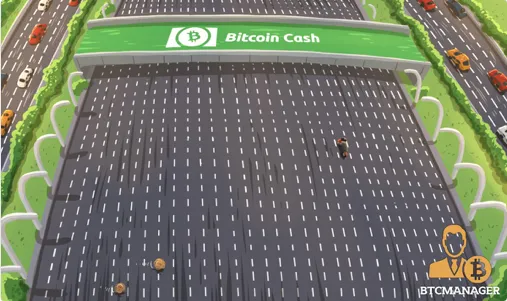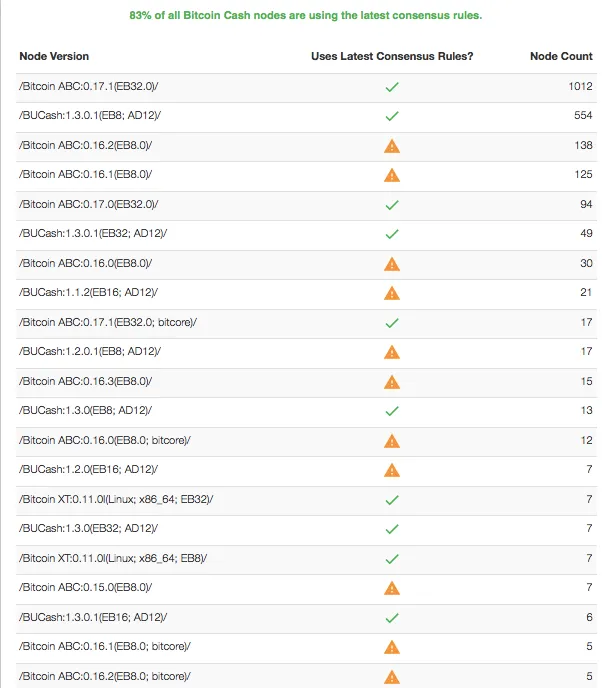Yesterday the hard fork of Bcash took place whereby the maximal block size was increased from 8 to 32 MB and old Bitcoin opcodes were re-introduced. The fork kicked 19% of the nodes off the Bcash network and 17% is still offline. This means that 17% of the users is not able to transact with Bcash at the moment, a big hit for the reliability of BCH as a store of value and medium of exchange as well.
This is exactly the reason why core devs never want to use hard forks to update the network except in an emergency situation. After years of calling the core devs arrogant, slow and even compromised, Bcash proponents can now see that there are good reasons behind it. This is the 3rd Bcash hard fork and two of them didn’t go smoothly (remember the EDA that caused hyperinflation followed by extremely slow transactions?).
Meanwhile BTC is up and running for almost ten years without mayor problems because the devs are conservative and responsible, and amazing scaling tech is being Rolled out as we speak.
I wrote about this subject before the fork:
https://steemit.com/bitcoin/@michiel/bitcoin-btc-vs-bcash-bch-a-closer-look-at-the-transactions-decide-yourself

https://twitter.com/btc_manager?lang=en
Was the update of Bcash necessary?
The opcodes implemented in Bcash were removed from BTC because of security reasons. Very serious bugs were found (read here more about it) and there is a fair chance that there are additional hidden bugs too. Since the hard fork yesterday the possibility of a security breach or network failure is greatly increased through these opcodes.

Wow, an update or a time bomb?
The block size increase was simply not necessary at all. The maximum block size might be big, but the actual block size is just over 50 KB, Bcash seems to be not so popular to transact with. This means that they can only fill up 5% of the block space when they would never have increased the block size and still had 1MB blocks like BTC.

They are only able to fill up 0.625% of the 8MB blocks as they had before the recent hard fork and since they have 32 MB blocks they use only 0.208% of the maximum block space!

Bitcoin still has by far the biggest actual blocks. Especially when you consider that Bitcoin transactions are way more efficient through Segwit and batching (read here more).
Unnecessary and harmful
The fork was not only very unnecessary, but did harm the network too. Nodes spit off and users are not able to make transactions. This is hilarious, because reliability is one of the (false) selling points of Bcash. As you can see many nodes are still offline and it doesn’t look like they come back online fast, only 2% managed to return within the first day.

Conclusion:
I think this fork was solely designed to create hype and pump (and dump) the Bcash price. The updates were not needed and make the network even less reliable and secure. Furthermore, there was no innovation involved at all, a block size increase can be coded by a child and the opcodes are simply copied / pasted from old Bitcoin code.
Since the track record of Bcash is that 2 out of 3 forks don’t go smoothly and there are giant risks in the base code now, I would strongly advise to dump all of your Bcash now before it is too late.
Bitconnect kept rising and brought great returns for over a year…….
Until it didn’t
Bcash could rise and give great returns for over a year……..
Until it doesn’t
Disclaimer
This is no financial advice, just my view on the market.
Never stress in a bear market anymore: Follow my diversification protocol
Store your Bitcoins securely
Ledger hardware wallet
Trezor hardware wallet
Trade Cryptocurrencies
Binance Exchange
Buy Bitcoins anonymous with cash
Localbitcoins
Protect your privacy with VPN and pay with crypto
Torguard
Buy gold securely with Bitcoin and store in Singapore
Bullionstar
Like this post? RESTEEM AND UPVOTE!
Something to add? LEAVE A COMMENT!